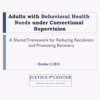Neighborhood-Based Supervision: A Review of Promising Practices
The practice of neighborhood-based supervision allows parole officers to interact closely with parolees within their social environment, as well as with community organizations and residents, providing them with insight into the parolees’ susceptibility to negative influences in the neighborhood. This webinar provided an overview of the research and practices of neighborhood-based supervision during the post-release stage of reentry. This webinar is particularly informative to parole offices in the field who work directly with parolees, field supervisors, community corrections administrators, other…
The practice of neighborhood-based supervision allows parole officers to interact closely with parolees within their social environment, as well as with community organizations and residents, providing them with insight into the parolees’ susceptibility to negative influences in the neighborhood. This webinar provided an overview of the research and practices of neighborhood-based supervision during the post-release stage of reentry. This webinar is particularly informative to parole offices in the field who work directly with parolees, field supervisors, community corrections administrators, other justice system personnel, and those working for community organizations with an interest in enhancing successful offender reentry strategies and initiatives. To download a PDF of the PowerPoint presentation used during this webinar, click here.
Find other events
You might also be interested in
Almost half of all violent crime in Kentucky is rooted in domestic violence (DV), and nearly 40 percent…
Read MoreArkansas policymakers have long expressed concerns about the state’s high recidivism rate. Over the past 10 years, an…
Read MoreGovernors emphasized a wide range of criminal justice and behavioral health initiatives in this year’s state-of-the-state addresses. From…
Read More Key Findings and Recommendations from Kentucky’s Justice Reinvestment Initiative to Better Understand and Address Domestic Violence
Read More
Key Findings and Recommendations from Kentucky’s Justice Reinvestment Initiative to Better Understand and Address Domestic Violence
Read More
 Apply Now for Resident Analyst Program to Increase Data Analysis Capacity at Departments of Corrections
Read More
Apply Now for Resident Analyst Program to Increase Data Analysis Capacity at Departments of Corrections
Read More


















